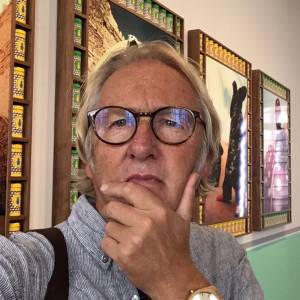Stuck in the Mud
Whoops, this is a bit dull. Not at all like me. I'd taken a cycle down there to pick up the post y'see and there was a boat stuck fast on the mud on the falling tide, waiting to get lifted again. So I took a photo of it.
After that I headed down town for a sniff about and got an excellent Icebreaker merino top - I'm reliably informed that I could wear it for a week and it still wouldn't be niffy. Excellent. And then there was a wee drink as of course it's my birthday eve!
And I also popped into the small exhibition of portraits of people associated with the Great War in the portrait gallery. I've got to say that I read the piece about Harry Lauder and his son, just when I was about to walk past his portrait without stopping. And I'll include it here for myself as I managed to find the excerpt online after much googling and wouldn't want to lose it again.
And later of course, there was the second of the debates. I really wished I hadn't watched.
"I will show you the place now, Mr. Lauder," he said, quietly. So we left the cars standing in the road, and set out across a field that, like all the fields in that vicinity, had been ripped and torn by shell-fire. All about us, as we crossed that tragic field, there were little brown mounds, each with a white wooden cross upon it. June was out that day in full bloom. All over the valley, thickly sown with those white crosses, wild flowers in rare profusion, and thickly matted, luxuriant grasses, and all the little shrubs that God Himself looks after were growing bravely in the sunlight, as though they were trying to hide the work of the Hun.
It was a mournful journey, but, in some strange way, the peaceful beauty of the day brought comfort to me. And my own grief was altered by the vision of the grief that had come to so many others. Those crosses, stretching away as far as my eye could reach, attested to the fact that it was not I alone who had suffered and lost and laid a sacrifice upon the altar of my country. And, in the presence of so many evidences of grief and desolation a private grief sank into its true proportions. It was no less keen, the agony of the thought of my boy was as sharp as ever. But I knew that he was only one, and that I was only one father. And there were so many like him—and so many like me, God help us all! Well, He did help me, as I have told, and I hope and pray that He has helped many another. I believe He has; indeed, I know it.
Hogge and Dr. Adam, my two good friends, walked with me on that sad pilgrimage. I was acutely conscious of their sympathy; it was sweet and precious to have it. But I do not think we exchanged a word as we crossed that field. There was no need of words. I knew, without speech from them, how they felt, and they knew that I knew. So we came, when we were, perhaps, half a mile from the Bapaume road, to a slight eminence, a tiny hill that rose from the field. A little military cemetery crowned it. Here the graves were set in ordered rows, and there was a fence set around them, to keep them apart, and to mark that spot as holy ground, until the end of time. Five hundred British boys lie sleeping in that small acre of silence, and among them is my own laddie. There the fondest hopes of my life, the hopes that sustained and cheered me through many years, lie buried.
No one spoke. But the soldier pointed, silently and eloquently, to one brown mound in a row of brown mounds that looked alike, each like the other. Then he drew away. And Hogge and Adam stopped, and stood together, quiet and grave. And so I went alone to my boy's grave, and flung myself down upon the warm, friendly earth. My memories of that moment are not very clear, but I think that for a few minutes I was utterly spent, that my collapse was complete.

Comments
Sign in or get an account to comment.


